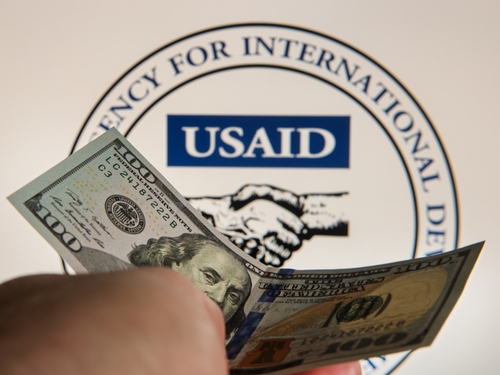- Home
- Daily News
- Lawyer for ABA, foreign-aid recipients tells…
Constitutional Regulation
Lawyer for ABA, foreign-aid recipients tells DC Circuit US should spend appropriated ‘pots of cash’

Congress in 2024 “appropriated very particular pots of cash for overseas help functions” and required the chief department to spend the total quantity, a lawyer representing the ABA and different teams difficult funding cutoffs stated Monday. (Picture from Shutterstock)
Congress in 2024 “appropriated very particular pots of cash for overseas help functions” and required the chief department to spend the total quantity, a lawyer representing the ABA and different teams difficult funding cutoffs informed the U.S. Court docket of Appeals for the District of Columbia Circuit on Monday.
The appropriations are necessary as a result of Congress didn’t use discretionary language, lawyer Daniel Jacobson of the Jacobson Attorneys Group informed the D.C. Circuit. “Not a single [appropriation] says, ‘as much as’ or ‘not more than,’” Jacobson stated.
Courthouse News Service and Law.com coated arguments by Jacobson and Sean Janda, the U.S. Division of Justice lawyer representing the federal government.
The funding freeze is barely momentary, Janda stated, as the federal government tries “to determine which of those funds it ought to reprogram, the way it ought to reprogram them.” Some funds may in the end be deferred or rescinded, he stated.
Underneath the Impoundment Management Act, Janda stated, the chief department can defer allotted funds as lengthy it sends a “particular message” to Congress to start out a dialogue about redistributing funds.
D.C. Circuit Choose Florence Pan pressed Janda about his assertion that the freeze was solely momentary, pointing to a publish by President Donald Trump on Reality Social, his social media platform, calling for the shutdown of the U.S. Company for Worldwide Improvement. D.C. Circuit Choose Gregory Katsas, however, requested Jacobson whether or not the related federal statutes “create some clear necessary obligation.”
U.S. District Choose Amir H. Ali of the District of Columbia had ordered the government in March to pay grant recipients and contractors for work accomplished earlier than Feb. 13, the date that he issued a short lived restraining order within the case. He also enjoined the federal government from unlawfully impounding congressionally appropriated foreign-aid funds.
Janda argued that Ali’s injunction ought to be vacated as a result of the plaintiffs had no function in imposing the related statutes relating to how and when the funds ought to be made out there. But when Ali had the authority to rule, his determination ought to be restricted to requiring the “particular message” to be despatched, Janda stated.
Ali had dominated that the suspension of funding was doubtless arbitrary and capricious in violation of the Administrative Process Act and was doubtless a violation of the constitutional separation of powers.
He had issued a nationwide injunction, a type of aid restricted by the U.S. Supreme Court docket in a June 27 decision. Jacobson informed the appeals courtroom that it ought to affirm the injunction however restrict it to the events within the case.
The ABA has said the freeze suspended “tens of hundreds of thousands of {dollars}” in federal funding for its overseas rule of legislation and human rights applications.
See additionally:
Ruling in ABA lawsuit, federal judge blocks pause on foreign aid but does not order Trump to act
Write a letter to the editor, share a story tip or update, or report an error.
